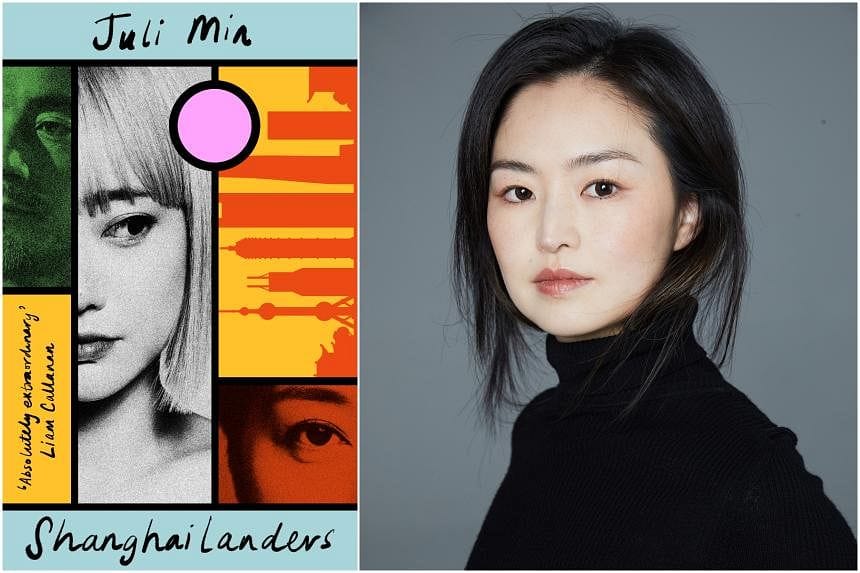Juli Min explores family, identity and love in debut novel Shanghailanders

Source: The Straits Times
Author: Charmaine Lim
SINGAPORE - Korean-American author Juli Min, 36, explores a form of Asian identity different from her own in her debut novel Shanghailanders.
Born in Seoul, South Korea, and raised in New Jersey in the United States, she has focused her 288-page novel on the experiences of a mixed family of five living in Shanghai, China. While her protagonist Leo Yang is Chinese, his wife Eko is Japanese-French and their three daughters speak Mandarin and French.
Min tells The Straits Times via a Zoom call from Shanghai where she is based: "These girls don't have an identity crisis like most immigrant stories about intergenerational conflict or trauma. These girls feel fully Shanghainese. It's their home, where they grew up. They're Asians living in this city and country where they look like the majority. They have a confidence that comes from that, and they're also beautiful, loved and come from extreme privilege."
The writer moved to Shanghai in 2016 marriage. She has a young daughter and son with her Shanghainese husband. She became the founding editor of the Shanghai Literary Review from 2016 to 2023, where she focused on fiction submissions.
She moved throughout her adult life, studying Russian and comparative literature at Harvard University in Boston, Massachusetts, returning to Seoul for a year as an English teacher, and working as a documentation specialist at American hedge fund company PDT Partners in New York for two years.
Rather than focusing on her more complicated hyphenated identity, Min chose to write about the experiences of Asian characters like her husband.
"My husband is Chinese and grew up in China. He has a more straightforward relationship to identity and I wanted to respect that. It's not all 'Who am I? I have so much trauma in my life.' Some characters in the book certainly have that and others are like, 'What do I do with my boyfriend because I'm 16 years old?'"
Her debut novel was written as a break from a historical fiction novel she had been working on.
With a laugh, she adds: "In some sense, it was a reaction to the absolute pain and trauma of writing a detailed historical fiction. That's just a beast."
Told in reverse chronological order, Shanghailanders starts in 2040 and moves backward through the years to 2014, when Leo and Eko get married. The narrative explores the secrets and relationship dynamics in this cosmopolitan family and how love and life bind this family unit.
She wrote nearly half the material in character sketches while contemplating how to string the novel together.
"In chronological order, you might see an affair, for example, and the breakdown of a marriage as a result. I don't think that's true to life, which is complicated and messy, and has beginnings at every point in time. The book moves backward to Leo and Eko's wedding, and I knew I wanted to capture the innocence and joy of that. One of the reasons I wrote it in this structure is because I play with time to show the different ways in which the past is always present."
As an editor for the Shanghai Literary Review, she discovered a love of writers who play with form: "I love when people take risks. One of the benefits of working for a small literary magazine is that you have to form a complete opinion on your own and stand by it. That's a lot of what I was doing as an editor, and I think it gave me a deeper understanding of myself as an artist, consumer and editor of work."
She wanted to challenge readers who may settle into assumptions or judgments of characters once they know how the story ends. By moving backward in time across the different perspectives, she examines what leads people to end up where they are.
Even the title subverts expectations. Though many use "Shanghailanders" to describe those living in Shanghai, some records show the term dates back to the 1910s. It described foreigners who lived in Shanghai after the 1842 Treaty of Nanjing between Great Britain and the Qing dynasty to end the First Opium War.
Min says: "I think there is room for readers of English literature to learn because oftentimes, the Western narrative of China is based on pivotal moments in Chinese history. When you have that kind of narrow education and view of a country, it's hard to get a sense of what the people and daily life are like.
"There are people living in the present, fighting with their sister, dealing with marital strife or having an affair. On some level, I wanted to capture that human experience. I was hoping to write from what I know and my experience of living in this incredible, enormous, complicated and contradictory city."
